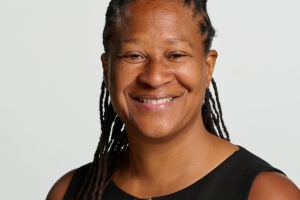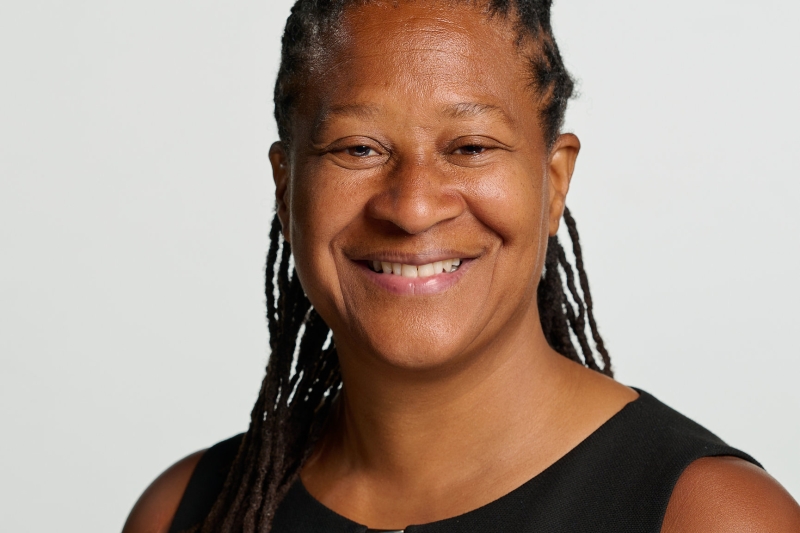
Faculty Spotlight: Catherine Smith Catherine Smith is the Vincent L. Bradford Professor of Law and is an expert in children’s equality law.
Catherine Smith was reading legal scholar Erwin Chemerinsky’s constitutional law hornbook on a treadmill when she happened upon a series of cases that hit home. The cases were in the section on equal protection law and focused on discrimination against nonmarital children.
“I thought to myself, ‘wow, my daughter has two moms, and as her biological mom, I am legally recognized but her non-biological mom is not. What protection does she have as the child of unmarried same-sex parents who are prohibited from marrying?’” said Smith, who joined W&L as the Vincent L. Bradford Professor of Law in the fall of 2024.
“I was intrigued by that,” said Smith, “and I began to write about it in the context of my daughter and her peers’ rights. When people think about the Fourteenth Amendment’s Equal Protection Clause, they primarily focus on race or gender discrimination. But what about people discriminated against because they are young?”
Her earliest articles were about children in families who were treated differently because of their same-sex parents, just as children through history were treated differently because their parents were unmarried or undocumented.
Smith has not only written numerous law review articles on the subject but also joined with three colleagues to write an amicus brief on the constitutional rights of children in the 2015 landmark Obergefell v. Hodges case that recognized that same-sex couples have a fundamental right to marry.
In the Obergefell majority opinion, Justice Anthony Kennedy wrote that “Marriage also affords the permanency and stability important to children’s best interests, “citing Smith’s co-authored brief. “I call it the ‘Zoe brief’ after my daughter,” Smith said. “Before Obergefell, in many states kids in LGBT families were considered complete legal strangers to their non-biological parent or non-adoptive parent with no legal way to create a cognizable relationship. For example, if something tragic had happened to Zoe’s other mom, Zoe would not have a right to her Social Security or worker’s compensation proceeds. She would also not have been able to inherit from her, and these are only a few of the hundreds of deprivations of benefits and privileges children in LGBT families were being denied.”
For Smith, writing the “Zoe brief” meant seeing the unfairness that existed and being able to put it into the language of law. That was just the beginning, as Smith continues to explore what she describes as “a whole landscape” of children’s constitutional rights yet to be written.
“We should reimagine the constitutional law canon from a children’s perspective,” said Smith, who joined with the W&L Law Review in March to organize the Lara D. Gass Symposium, spotlighting youth-powered movements to address the impacts of climate change on young people. “Our nation’s default is to envision constitutional law only for adults. But people should have the right to be free from discrimination or the right to a sustainable climate no matter their age or capacity.”
Smith’s work on children’s rights received a significant boost in 2023 when she and co-collaborators received a $2 million gift from an anonymous donor to help form the Consortium for the Advancement of Children’s Constitutional Rights. As Smith said of the consortium, the goal is to change “how we see children and understand, approach, and enforce their rights.”
Smith credits her mother’s “brainwashing” for her choosing a career in the law. “I was pretty argumentative, and my mother thought I’d be a good lawyer,” she said. Her parents grew up in South Carolina during the Jim Crow era. They attended segregated two-room schoolhouses from K-12 and were mostly taught by their relatives. They went to college at South Carolina State, an HBCU. (The University of South Carolina and Clemson did not desegregate until 1963.)
After graduation, Smith’s father joined the military. “My parents believed in the power of law and lawyers and encouraged me to pursue this path,” she said. “Researching and writing about the history of Jim Crow and Brown v. Board of Education from a children’s rights perspective also has deep resonance for me because of my parents’ experiences.”
Smith grew up as an Army brat, and her family moved often. She graduated high school on a NATO base near Brussels, Belgium, and returned to South Carolina to attend Wofford College. “After serving tours in Vietnam, my dad taught military science at Wofford, serving as one of the first African American faculty members there, so it was a familiar place,” said Smith, who captained the Terrier volleyball team during her undergraduate career.
From Wofford, she went to law school at the University of South Carolina. After two federal judicial clerkships, Smith spent two years as a legal fellow with the Southern Poverty Law Center. She had been at the SPLC only a few weeks when she sat third chair to the Center’s co-founder, Morris Dees, representing a defendant in a death penalty case in Montgomery, Alabama.
“Being trained at SPLC was an amazing and humbling experience,” she said. “I worked on a full range of civil rights cases and learned to use law in creative ways to challenge white supremacist groups, including drafting a complaint that eventually bankrupted a chapter of the Aryan Nations.”
From SPLC, Smith began her teaching career at Texas Southern’s Thurgood Marshall Law School in Houston. She then lateraled to the University of Denver’s Sturm School of Law where she was named the Attorney of the Year by the Colorado LGBT Bar Association in 2019 and received the Robert B. Yegge Excellence in Teaching Award in 2023.
Smith wasn’t looking to leave Denver when she and her partner, Suzette Malveaux, the Roger D. Groot Professor of Law, were recruited to join the W&L faculty in the summer of 2024. Now in Lexington, Smith said she has not only found the law school community incredibly supportive and intellectually rigorous, but also that the smaller size is especially conducive to teaching and learning. “It’s more intimate,” she said. “You get to have longer conversations with the students and the back and forth informs my research agenda and continuously challenges my thinking in many ways.”
Plus, the age range of her students puts them in close proximity to the young people whose rights Smith is championing in her work. She is teaching a seminar on Children and the Constitution this semester and will teach Torts and Children and the Law next fall.
“It’s an amazing privilege to be in this job and to teach and think about complex ideas while having this group of really smart and idealistic people flesh them out with you. The students really want to unpack the legal questions and issues because many of them came to law school because of what they witnessed or experienced as young people. It is enlightening and extremely rewarding.”
If you know any W&L faculty who would be great profile subjects, tell us about them! Nominate them for a web profile.
 Professor Catherine Smith
Professor Catherine Smith
You must be logged in to post a comment.